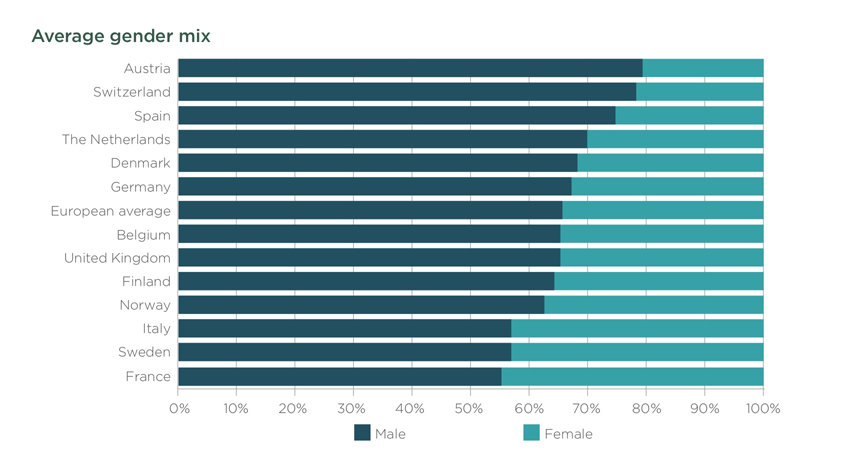The representation of women on European boards is slowly, but surely increasing, according to Korn Ferry’s latest Non-Executive Directors in Europe report. The study, which examines 393 listed companies across 13 European countries, found that overall the proportion of female directors have increased year on year. In 2019, Europe’s boards comprised 34% women, up from 32% in 2018 and 30% in 2017.
France, Sweden and Italy lead the way when it comes to gender diversity on boards. France now has the highest proportion of female directors on its boards (45%) thanks to ‘binding’ legislation. In fact, Italy has also seen the proportion of female directors on its boards increase in recent years to 43% without the use of quotas. Austria, however, comes in last with the lowest number of female directors (20%) on its boards.
INCREASING FEMALE REPRESENTATION
Korn Ferry’s report reveals that the number of women holding deputy chair/senior independent director positions increased to 20% (up from 18% compared to the previous year). The number of women in remuneration chair roles rose to 31% (up from 25%) and chair of the audit increased to 29% (up from 24%).
Across Europe the number of committees without any female directors dropped, with 19% of audit committees (down from 24%) and 25% of remuneration committees (down from 29%). However, just 8% of all non-executive board chairs are women, representing no change since the year before.

Source: Non-Executive Directors in Europe report published by Korn Ferry.
BOOSTING FEMALE PRESENCE
“Different countries have adopted different approaches to boost female presence in the boardroom. Some have set internal targets while others, unsatisfied with slow progress, have resorted to binding obligations using strict quotas to prioritise female hiring,” stated Sonamara Jeffreys, Co-President of Korn Ferry EMEA.
“Both approaches have had success in different countries, suggesting there’s no one way to handle this problem – it’s about identifying the stumbling blocks in each situation and being flexible in how to address them.”
Korn Ferry’s report also reveals less pay disparity between male and female board members in the region. Across Europe, male non-executive directors receive 5% (median) more in total fees than their female counterparts, which is an improvement of 1% from the previous year. According to the findings, the gap appears to result mainly from an underrepresentation of women on the strategically important board committees, which has translated into female board members being paid less than men.
BOARD PAY VARIATIONS
The report also reveals that director remuneration and fee policy varies widely across Europe. Board fees are typically compensated with fixed fees. According to the report, the median basic policy fee paid to directors across Europe is €70,000, with significant fee variations across the region, often based on time and responsibility commitment, as well as local practice. Universally, directors who are on a board committee, such as an audit committee or remuneration committee, receive an additional fee.
The study also found that pay structures have continued to develop, but not in a uniform way. Some countries, like Germany, continue to see a share of companies use variable compensation for non-executive directors, which stands in sharp contrast to practices in countries like the United Kingdom. Fees delivered in shares are popular in countries like Switzerland and Finland, but are almost unheard of in other countries like Italy and the Netherlands.
Click here for a copy of the report.








































